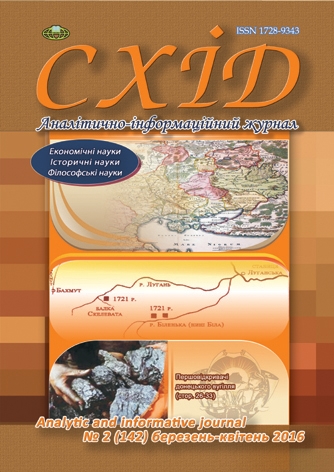Information war. The USA and Great Britain during World War II (1939 - 1945)
DOI:
https://doi.org/10.21847/1728-9343.2016.2(142).70479Keywords:
USA, Great Britain, information war, propaganda, OWI, Ministry of Information, broadcast, leafletsAbstract
In the current development context of the political world such phenomenon as 'information war' is used by numerous states as an instrument for implementation of their foreign policy. The outset of information war can be related to the early 20th century, it was however World War II which gave an impetus to the development of information war that, subject to its purposes, acted as propaganda, counterpropaganda, psychological war etc. The paper covers an information aspect of foreign activities of theUSAandGreat Britainduring World War in respect ofGermany. It is shown that, depending on the time of the entry of one or another country into the war, there were some agencies set up, which were charged with carrying out information activity overseas. In theUSAsuch agencies were the Office of Coordination Information, the Office of War Information, the United States Information Service and others. InGreat Britainit was the Ministry of Information, which exercised the above function. The paper covers the setup process of the organizations in question and their core activities. It is indicated that when World War II had ended, the above agencies were wound up, their functions delegated to other government institutions. The paper places special emphasis on enemy disinformation operations (use of secret agents, radio broadcasting, distribution of leaflets, broadsheets and newspapers) which eventually resulted in achievement of the main goal of the allies in the war - the victory.
Downloads
References
Varenko V. (2014), Information-analytical activity, Universitet Ukraina Publishing, Kyiv, 417 p. (ukr).
Valyuzhenich A. (1973), The foreign political propaganda, Meshdynarodnye otnosheniya Publishing, Moscow, 216 p. (rus).
Kashlev Y., Galumov E. (2003), Information and PR in international relations, Izvestiya, Moscow, 432 p. (rus).
Pocheptsov G. (2000), Information wars, Vakler, Kyiv, 576 p. (rus).
Pocheptsov G. (2000), Psychological wars, Vakler, Kyiv, 528 p. (rus).
Volkonskiy N. (2003), History of information wars, Poligon, Sant-Peterburg, 736 p. (rus).
Balfour M. (2011), Propaganda in War 1939-1945: Organizations, Policies and Publics in Britain and Germany, Faber and Faber, London, 538 p. (engl).
Rhodes A. (1987), Propaganda: The Art of Persuasion World War II, Wellfleet Press, London, 319 p. (engl).
Executive Order 9182 Establishing the Office of War Information, available at: http://www.presidency.ucsb.edu/ws/?pid=16273 (engl).
Executive Order 9182 on the Office of War Information, available at: http://www.presidency.ucsb.edu/ws/?pid=16372 (engl).
Winkler А. (1978), The Politics of Propaganda: The Office of War Information, 1942-1945, Yale University Press, New Haven, 230 p. (engl).
The Journal of American History (1968), 1, pp. 73-89 (engl).
Overy R. (1997), Why the Allies Won, W.W. Norton & Company, London, 416 p. (engl).
USA:Washingtontelegram No 5307. Co-ordination of Political Warfare Executive and Office of War Information (US) propaganda, available at: http://discovery.nationalarchives.gov.uk/details/r/C6567485 (engl).
War (General): To Ministry of Information. Statement about W(g)/42/67 for issue to the Press, available at: http://discovery.nationalarchives.gov.uk/details/r/C6568365 (engl).
Downloads
Published
How to Cite
Issue
Section
License
Copyright (c) 2016 Tetiana Klynina

This work is licensed under a Creative Commons Attribution-NonCommercial-NoDerivatives 4.0 International License.
1. Authors bear responsibility for the accuracy of facts, quotations, numbers and names used.
2. Manuscripts are not sent back.
3. The publisher does not always agree with the authors' opinion.
4. The authors reserve the right to authorship of the work and pass the first publication right of this work to the journal under the terms of a Creative Commons Attribution-NonCommercial-NoDerivatives 4.0 International License. This license allows others to distribute (copy) the published work for non-commercial purposes, provided there is mandatory attribution to its authors and a link to the first publication in our journal.
5. The authors have the right to conclude separate supplement agreements that relate to non-exclusive work distribution in the form in which it has been published by the journal (for example, to upload the work to the online storage of the journal or publish it as part of a monograph), provided that the reference to the first publication of the work in this journal is included.

